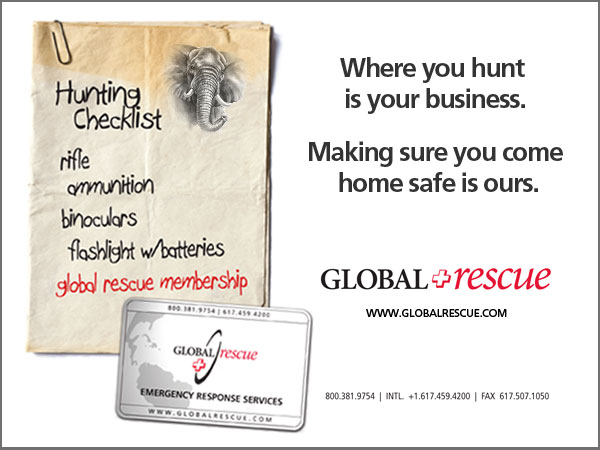- Joined
- Oct 1, 2007
- Messages
- 13,305
- Reaction score
- 9,588
- Website
- www.africahunting.com
- Media
- 5,597
- Articles
- 321

Travel Size Toiletries
- Hairbrush/comb
- Toothbrush
- Toothpaste
- Dental floss/toothpick
- Q-tips
- Soap
- Shampoo
- Razor and blades
- Shaving cream (Non-aerosol for carry on)
- Deodorant (Non-aerosol for carry on)
- Cologne (not a good idea to wear while visiting a malaria area)
- Moisturizing lotion (unscented if visiting a malaria area)
- Nail scissors or clippers
- Tweezers
- Kleenex
- Lip balm with high SPF
- Sun block with high SPF, I recommend waterproof it lasts even if sweating and unscented if traveling to a malaria area. No matter how much you hate the sticky stuff, the sun is very intense in Africa even in the winter. Perhaps because people don't feel as concerned about sunburn when the air is cooler they just don't take the sun as seriously, but I have seen the worst sunburns during the winter in Africa.
- Ziplock bags, generally very useful and versatile, a great way to contain items that may leak in your luggage.
First Aid
- Personal medical first aid kit. Your outfitter should have a first aid kit, however many basic medications may not be included. A personal medical first aid kit in my opinion is essential. I recommend if you will be traveling to a remote area, especially in a third world country, to consider purchasing a customized a first aid kit from Wilderness Medical Systems. Created specifically for you and your travel destination, including prescription medications and so much more, for more information click here.
- Treatments for jet lag
- Insect/mosquito/tick repellent (preferably odorless)
- Itch cream with cortisone
- Anti-diarrhea pills
- Aspirin or ibuprofen
- Antibiotic cream
- Band aid for cuts
- Moleskin or Band Aid blister block for the prevention of blisters and/or Band Aid cushions for advanced healing blisters
- Dehydration treatment
- Laxative
- Antacid
- Hand sanitizer gel
- Eye drops
- Motion sickness remedies
- Decongestant pills (for congestion due to colds or allergies)
- Allergy pills, many people who do not suffer from allergies at home may suddenly find themselves terribly allergic to something they encounter in Africa. I encourage everyone to bring along an allergy pill that does not cause drowsiness even if you are not prone to alleries and especially if you are. They can also be helpful for people who have strong reactions to insect bites, especially from mosquitoes or tsetse flies.
Prescription Medication
If you bring prescription medication they should be packed in your carry on luggage and you should have enough to last you through your trip. They should be prescribed in your name and be in their original prescription bottles to avoid problems at customs. If you are carrying liquid medication, be sure to place them in a quart size zip lock bag for airport security.
- Your regular prescription medications
- Copies of prescriptions for medications that you are carrying
- Anti-malaria pills
- Broad spectrum antibiotics
- Sleeping pills
- Pain killers
- Bee allergy shot
Emergency Evacuation and Field Rescue Membership

Hydration & Energy
- Power bars, this is great for a boost of energy
- Gatorade or other electrolyte drinks in single dose powdered packets, that can be easily poured into a small bottle of water; these are great for re-hydration and energy
- Canteen, keeping hydrated is essential, the hunting team should carry water for the client at all times; you never know when stepping out the vehicle where the course of events is going to take you. Your outfitter should have this organized however some hunters like to bring their own water as well.
- Water purifier, in most cases not needed but ask your outfitter
- Water purification with filters, in most cases not needed but ask your outfitter
- Water purification tablets, in most cases not needed but ask your outfitter
- SteriPEN, UV light water purifier, effective, light weight & compact for travelers, in most cases not needed but ask your outfitter
Personal Items
- Prescription glasses and/or clear shooting glasses with strap and case. Will protect your eyes, day or night, against sand, thorns and insects.
- Sunglasses, strap and case
- Contact lenses & solution (glasses are more practical and provide added protection)
- Earplugs (for hunting, travel or sleeping)
- Small sewing kit
- Cell phone and/or satellite phone (a lot of cell phones will work in Africa; check with your telephone service provider to see if your phone has the capability to be activated. Sat phones can be rented at www.globalphoneworks.com)
- Watch with alarm or alarm travel clock
- Field guide
- Shot placement book
- Small notebook and pen to keep journal or take notes
- List of addresses or pre-printed mailing labels for sending postcards back home
- Something to read
- Reminder list of things that you wanted to do or buy
Gifts
Many hunters like to bring small gifts for PH, trackers, lodge manager or lady of the house or camp staff, which is always a nice gesture and are usually very well received.
- Clothing
- Baseball caps
- Knives
- Flashlights
- Candy (something that does not melt)
- Cigarettes
- Perfume
Last edited by a moderator:
